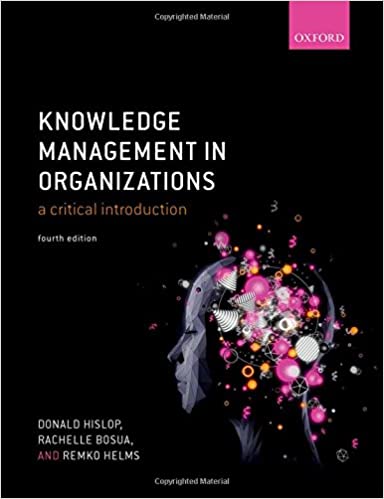(eBook PDF) Knowledge Management in Organizations: A critical introduction 4th Edition
$50.00 Original price was: $50.00.$35.00Current price is: $35.00.
(eBook PDF) Knowledge Management in Organizations: A critical introduction 4th Edition – Instant Download
(eBook PDF) Knowledge Management in Organizations: A critical introduction 4th Edition – Digital Ebook – Instant Delivery Download

Product details:
- ISBN-10 : 0198724012
- ISBN-13 : 978-0198724018
- Author: Donald Hislop (Author), Rachelle Bosua (Author), Remko Helms (Author)
Knowledge Management in Organizations is the most comprehensive and critical textbook on the subject. Encompassing a number of perspectives – including organizational behaviour, HRM, systems, and sociocultural factors – the text introduces the concept of knowledge before examining how it can be effectively managed within the organizations in which we work.
The international author team ensure the broad theoretical coverage is brought to life with practical illustrations and case studies exploring topics such as knowledge sharing via social media, knowledge transfer in different cultural contexts, and the interaction of leadership, culture, and knowledge management in Australian SMEs. Examples are diverse, international, and highly relevant to each chapter, showcasing the significance of knowledge management in all types of organizational settings.
Table contents:
1. The Contemporary Importance of Knowledge and Knowledge Management
Part 1: Epistemologies of Knowledge in the Knowledge Management Literature
2. The Objectivist Perspective on Knowledge
3. The Practice-Based Perspective on Knowledge
Part 2: An Introduction to Key Concepts
4. What is Knowledge Management?
5. Knowledge Intensive Firms and Knowledge Workers
6. Learning and Knowledge Management
Part 3: Innovation, Knowledge Creation and Unlearning
7. Innovation and Knowledge Processes
8. Unlearning, Knowledge Loss, of the Protection of Knowledge
Part 4: Introduction to ICTs and Knowledge Management
9. Objectivist Perspectives on ICTs and Knowledge Management
10. Practice-based Perspectives on ICTs and Knowledge Management
Part 5: Socio-Cultural Issues Related To Managing and Sharing Knowledge
11. The Influence of Socio-Cultural Factors in Motivating Workers to Participate in Knowledge Management Initiatives
12. Communities of Practice
13. Boundary-Spanning Knowledge Processes in Heterogeneous Collaborations
14. Power, Politics, Conflict, and Knowledge Processes
Part 6: The Management of Knowledge Work (and Workers)
15. Facilitating Knowledge Management via the Use of Human Resource Management Practices
16. Leadership, Organizational Culture Management, and Knowledge Management
People also search:
example of knowledge management in organizations
importance of knowledge management in organizations
evaluating the importance of knowledge management in organizations
application of knowledge management in organizations
how to implement knowledge management in organizations
explain the role played by the knowledge management in organizations


